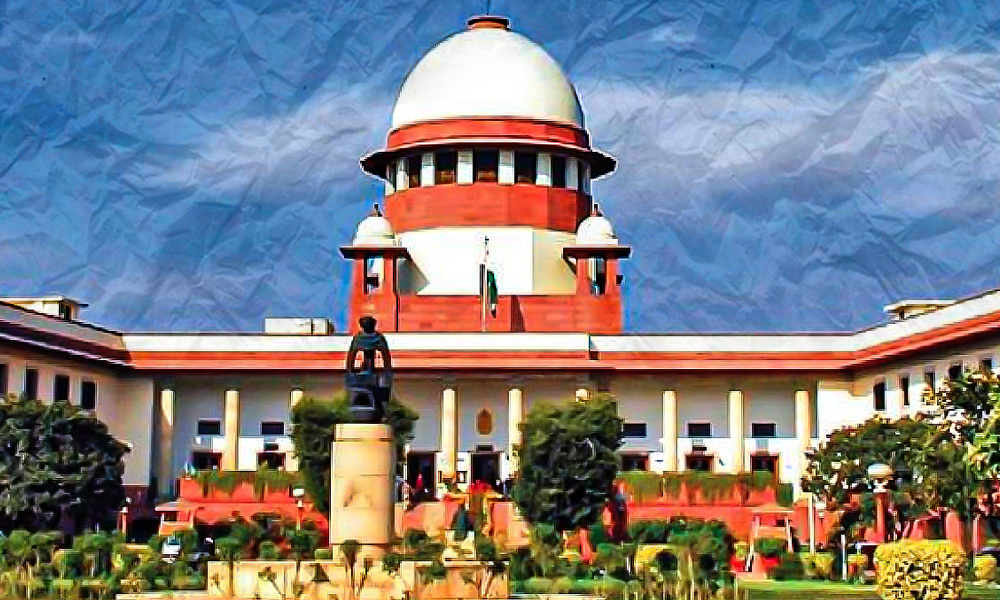
Image Credit: New Indian Express
'For How Many Years Reservation Would Continue In Jobs, Education': SC Asks In Maratha Quota Case
Writer: Deep Prakash
A film and theatre enthusiast. Love to read history and political books. Acting and cinematography is what he loves. Love to report on current trending issues and political happenings.
Delhi, 20 March 2021 10:43 AM GMT
Editor : Prateek Gautam |
A free soul who believes that journalism, apart from politics, should stand for social cause and the environment.
Creatives : Rajath
A free spirit who find meaning in life with the virtue of creativity and doing job par its excellence, animal lover and traveller by heart.
The Constitutional bench of Supreme Court observed, "The purpose of re-examining the Mandal judgement is that those who have come out from backwardness must be eliminated."
While hearing the Maratha quota case on Friday, March 19, a Constitution Bench of the Supreme Court asked for how many generations would reservation in jobs and education continue. The bench also sought to know whether the right to equality under Article 14 of the Constitution would be affected in case the overall 50 per cent limit was to be removed.
"If there is no 50% limit, what is the concept of Article 14 then? What would happen to the resultant inequality and for how many generations will this continue?" the bench asked Senior Advocate Mukul Rohatgi, who was appearing for Maharashtra and pleading for a reconsideration of the 50% cap imposed by the Indra Sawhney judgement.
Rohatgi told the five-judge bench, headed by Justice Ashok Bhusan and constituting Justices L Nageswara Rao, S Abdul Nazeer, Hemant Gupta and S Ravindra Bhat, that due to the changed circumstances there was a need for re-examination on the Mandal judgement of capping the quota, reported NDTV.
Arguing over the many reasons needed for the re-examination of the Mandal judgement, Rohatgi said, "Mandal judgement was premised on the census of 1931 and in the view of the changed circumstances, the courts should leave it to states to fix reservation quotas."
Rohatgi argued that the population has increased many folds and reached 135 crores since the judgement.
Referring to various aspects of the Mandal judgement, also known as the Indra Sawhney case, Rohatgi said that the Centre's decision to grant a 10 per cent quota to people from economically weaker sections directly breach the 50 per cent cap.
The constitutional bench said, "70 years have passed since independence so many beneficial schemes have been carried out by the states and can we accept that no development has taken place, that no backward caste has moved forward. The purpose of re-examining the Mandal judgement is that those who have come out from backwardness must be eliminated."
Replying to this observation, Rohatgi said, "We definitely have moved forward. But it is not that backward classes have gone down from 50% to 20%. In this country, there are still deaths happening due to starvation. I am not saying that Mandal judgement is totally wrong and we should throw that into the dustbin. The only issue I am raising here is that 30 years have gone by, the population has grown, the law has changed and backward persons may also have increased."
Referring to the amendments made in the constitution, Rohatgi said that there are indicators that show that the country has not reached anywhere near the emancipation which is required for its backward classes.
Arguing over the issue, Rohatgi added, "The parliament should know about the happenings going on in this country. If this is known by parliament it is more than 50% and 10 % to a class of economically backward section has been given then no warrant from court should say it cannot go over 50%."
"In this situation, when a number of states have reservations which exceed 50%, it cannot be said that this is not a 'burning issue' and it does not require a re-examination after 30 years," added Rohatgi.
The arguments over this case were inconclusive and would resume on Monday.
Also Read: UP: Woman, Newborn Bleed To Death After School Drop-Out Performs 'C-Section' With Razor Blade
 All section
All section














